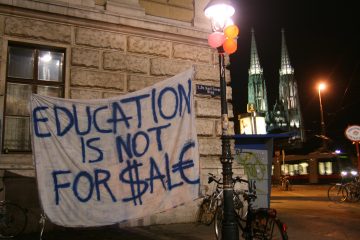Far-right presidential candidate, Jair Bolsonaro, was elected with 55 percent of the vote in the Brazilian elections last Sunday. He defeated the Workers’ Party (PT) candidate, Fernando Haddad, who received 45 percent. From day one, students and youth have been first into the breach, leading the fight against the reactionary new regime.
How did Bolsonaro win?
Bolsonaro is an intensely reactionary politician: misogynistic, homophobic, racist and virulently anti-socialist. He has described left-wingers (whom he labels the “red mob”) as terrorists and threatened them with imprisonment.
We should point out, however, that his election does not represent a victory of fascism (despite the hysterical reaction of the reformist press). Despite his violent rhetoric and far-right programme, Bolsonaro does not stand at the head of a mass force of petty-bourgeois militants with the goal of physically liquidating the working class.
The working class and its organisations in Brazil are still strong and remain largely untested. If mobilised, they could easily and vastly outnumber any reactionary threat on the streets. We are already seeing a taste of this with the counter-protests against Bolsonaro supporters that have taken place since Sunday.
Bolsonaro is certainly a far-right strongman with strong links to the military (being a former army captain). He has praised the military dictatorship that ruled in Brazil until 1985. And he counts genuinely fascist gangs among his support base. These gangs, despite being small, are dangerous. Already they have attacked and killed PT supporters, carving swastikas into their flesh.
But Bolsonaro’s victory is in large part the fault of the PT, who during their 13 years in power betrayed the trust of the Brazilian working class by carrying out austerity. In the second round of this election, Haddad pursued a suicidal line of seeking a “unity of democrats” against “fascism” – that is, unity between the workers’ party and the very same right-wing bourgeois parties that only two years ago conspired to impeach PT President Dilma Rouseff.
In so doing, Haddad came to be seen as being no different from the rest of the political establishment. Bolsonaro, by contrast, much like Donald Trump in America, presented himself as the ‘anti-establishment’ candidate: standing against the corrupt and rotten status quo.
The lack of a serious, socialist alternative (combined with 42m non-voters) meant Bolsonaro’s ‘anti-system’ rhetoric won the day. In actual fact, he represents the crudest and most unashamed continuation of the capitalist status quo, and will deliver Brazil directly into the hands of imperialist finance capital with his ultra-liberal, anti-worker agenda.
Students fight back against repression!
Prior to the election, the Brazilian youth got a taste of the repression to come under a Bolsonaro government. More than 20 universities were invaded by military police, who confiscated ‘anti-fascist’ materials and interrupted classes due to “ideological content”, under the pretence of ensuring “electoral fairness”. In reality, this was a blatant attempt by the state to shut down any dissent against Bolsonaro.
In Rio, the courts ordered the Fluminense Federal University to remove an anti-fascist banner from the Law School façade, threatening the university director with arrest if it wasn’t taken down within 12 hours. The police also removed flags and banners in support of Marielle Franco (city councillor of Rio for the Socialism and Liberty Party, who was murdered in 2018). In Rio Grande do Sul, an event entitled “Against Fascism, for Democracy” was prohibited by an electoral court, and a lecturer was threatened with arrest by the military police for allegedly criticising Bolsonaro. Similar stories have been reported from all over Brazil.
These manoeuvres by the state follow an intervention by the judiciary in April, who charged the favoured PT candidate – Lula – with a trumped-up corruption charge, preventing him from standing in the elections. At the time of this ruling, Lula was the most popular politician in Brazil.
These Bonapartist tendencies in the Brazilian state (with the judiciary raising itself ‘above’ the classes and intervening directly in the interests of the ruling class) will only intensify under a Bolsonaro government.
In the conditions of capitalist crisis, Bolsonaro will attempt to circumvent bourgeois democratic processes and use the levers of state power to force his reactionary policies on the Brazilian people. However, this will provoke a confrontation with the working class and youth, many of whom are already out on the streets protesting against the new regime.
Left-wing students have responded to state repression and intimidation by organising in defence of their democratic rights. On Monday, 15 pro-Bolsonaro supporters attended a ‘march’ at the University of Sao Paulo (a pitiful number, considering the thousands who expressed interest on Facebook). They were met by a counter-demonstration of 500 students, chanting anti-Bolsonaro slogans, who proceeded to break up the march.
On the same day, students at Brasilia University (UNB) repelled a group of 30 Bolsonaro supporters who tried to invade their campus to “hunt down communists”. They tuned up in the yellow-and-green of the Brazilian flag and carried pictures of the new president. In response, hundreds of students crowded the entrance to the campus to prevent the Bolsonaro supporters from entering. This led to a physical confrontation, where the invaders were eventually forced to retreat.
This kind of resolute response points the way forward, and should serve as an example to the rest of the youth and the working class.
Build the resistance
These clashes are only the precursors of battles to come. However, they clearly demonstrate that Bolsonaro and his thugs will be met with fierce opposition if they attempt to threaten and intimidate workers and youth.
The task now is for students and youth to link up with the working class, represented by mass organisations like the Trade Union Confederation (CUT), and organise a unified resistance to this reactionary new government.
Capitalists all over the world have warmly welcomed Bolsonaro, who has promised to slash public services, attack trade unions and open Brazil up to an orgy of exploitation and profiteering by international speculators. It is the task of the international labour movement and progressive students everywhere to send our solidarity to the budding opposition to Bolsonaro, represented by the students who have already physically confronted the forces of reaction on their campuses.
This election is a set-back for the Brazilian working class and youth. But the real confrontation is still to come. In the examples above, it is notable that Bolsonaro’s supporters were massively outnumbered by the counter-demonstrations, which gives a sense of the real balance of forces in Brazil.
The task now is to learn the lessons from these elections, abandon the failed strategies of class collaboration with the establishment ‘against fascism’, and gather our forces for the battles ahead.
By Joe Attard, London Marxists




0 Comments